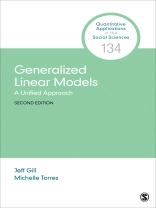Generalized Linear Models: A Unified Approach provides an introduction to and overview of GLMs, with each chapter carefully laying the groundwork for the next. The Second Edition provides examples using real data from multiple fields in the social sciences such as psychology, education, economics, and political science, including data on voting intentions in the 2016 U.S. Republican presidential primaries. The Second Edition also strengthens material on the exponential family form, including a new discussion on the multinomial distribution; adds more information on how to interpret results and make inferences in the chapter on estimation procedures; and has a new section on extensions to generalized linear models.
Software scripts, supporting documentation, data for the examples, and some extended mathematical derivations are available on the authors’ websites as well as through the /texttt{R} package /texttt{GLMpack}. Supporting material (data and code) to replicate the examples in the book can be found in the ′GLMpack′ package on CRAN or on the website&
Mục lục
Series Editor′s Introduction
About the Authors
Acknowledgements
1. Introduction
Model Specification
Prerequisites and Preliminaries
Looking Forward
2. The Exponential Family
Justification
Derivation of the Exponential Family Form
Canonical Form
Multi-Parameter Models
3. Likelihood Theory and the Moments
Maximum Likelihood Estimation
Calculating the Mean of the Exponential Family
Calculating the Variance of the Exponential Family
The Variance Function
4. Linear Structure and the Link Function
The Generalization
Distributions
5. Estimation Procedures
Estimation Techniques
Profile Likelihood Confidence Intervals
Comments on Estimation
6. Residuals and Model Fit
Defining Residuals
Measuring and Comparing Goodness-of-Fit
Asymptotic Properties
7. Extentions to Generalized Linear Models
Introduction to Extensions
Quasi-Likelihood Estimation
Generalized Linear Mixed Effects Model
Fractional Regression Models
The Tobit Model
A Type-2 Tobit Model with Stochastic Censoring
Zero Inflated Accomodating Models
A Warning About Robust Standard Errors
Summary
8. Conclusion
Summary
Related Topics
Classic Reading
Final Motivation
9. References
Giới thiệu về tác giả
Michelle Torres is Assistant professor in the Department of Political Science at Rice University. She holds a Ph D in Political Science and a AM in Statistics from Washington University in St. Louis. Her research interests are in the fields of political methodology, with a special focus on survey methodology, computer vision, causal inference, public opinion, and political communication.











